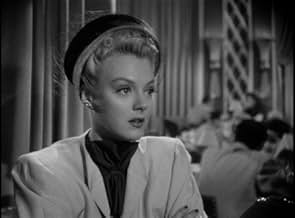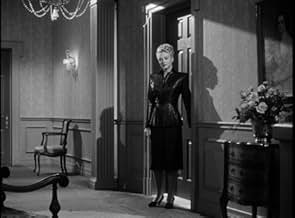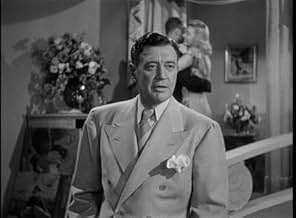Agrega una trama en tu idiomaA wealthy wife suspects her artist husband's affair with his model. He poisons his wife for inheritance but faces unexpected consequences after her death. A thriller exploring greed, betraya... Leer todoA wealthy wife suspects her artist husband's affair with his model. He poisons his wife for inheritance but faces unexpected consequences after her death. A thriller exploring greed, betrayal, and the consequences of criminal actions.A wealthy wife suspects her artist husband's affair with his model. He poisons his wife for inheritance but faces unexpected consequences after her death. A thriller exploring greed, betrayal, and the consequences of criminal actions.
- Dirección
- Guionistas
- Elenco
- George
- (sin créditos)
- Messenger Boy
- (sin créditos)
- Artist
- (sin créditos)
- Henry Loring
- (sin créditos)
- Whistler
- (sin créditos)
- Jorgensen
- (sin créditos)
- McLaren aka Mac
- (sin créditos)
- Butler
- (sin créditos)
- Girl
- (sin créditos)
- Detective Lieutenant
- (sin créditos)
- Girl
- (sin créditos)
- Dirección
- Guionistas
- Todo el elenco y el equipo
- Producción, taquilla y más en IMDbPro
Opiniones destacadas
In this outing he plays a man married to a woman purely for her money and who falls in love with a younger woman who is after him purely for his (her) money. How the situation is nefariously resolved is the plot, simply and carefully plotted. The way the actors spoke their words beginning with capital letters in this - and other entries in the series - makes me think this must have been adapted and expanded from one of the scripts of the 231 radio plays already aired by then. Whether playing a goodie, baddie or bothie Dix exuded a simple yet intense sincerity, he's basically a baddie with all the usual human failings in here and yet you can still find yourself rooting for the poor mutt. Leslie Brooks as the not-too-bad gold-digger artists model was never more alluring, I was definitely rooting for her! There's a poignant twist at the end, so attention is recommended.
Sadly neglected, about time they were all available on DVD, a nice entry in a nice series for those of us who like the genre.
Here he plays a less than admirable character. He is a painter. Amazingly, the painting of his that we first see is pretty decent. So often, even in the toniest of A-pictures, paintings by supposedly great artists looked like the work of quick-sketch artists or Sunday painters.
The film opens with a stylishly noirish woman buying her own tombstone. Everything bout this film has the marvelous dark look of a film noir. Or of an Edward Hopper paintings. The scenes look especially like book jackets from the time.
And the female lead looks right off the cover of some true-crime book. Wow, she looks both right and beautiful! And she -- Leslie Brooks -- is a fine actress too. (Intriguingly, she looks like the same studio's biggest star ten years hence: Kim Novak.)
The whole series is entertaining, even the final film, which does not have Dix in it.
One problem I encountered and others may as well: Clearly the movies were based on a radio program of their time. I have never heard that program, though. I get the idea that the Whistler is an omniscient criminologist who either has no bodily image or, like Lamont Cranston of "The Shadow," can make himself invisible.
Guess I will try to track some tapes of the series down. In the meantime, do yourself a favor and search out these films. They're all good. A couple, like this one, are very good.
Again the Whistler just walks around as Narrator. He doesn't get involved in the plot.
The series stars Richard Dix. Here he plays Ralph Harrison, a not great artist who lives off his sick wife's (Mary Currier) money. In the beginning of the film, we see her ordering her own gravestone!
Edith Harrison has a terminal heart condition. When her husband meets model Kay Morrell (the very pretty Leslie Brooks), he falls in love with her. However, a new doctor has gotten Edith out of her sickbed and ready to live again.
Edith goes to her husband's studio to surprise him. She's the one surprised as she overhears him declaring his love for Kay and saying Edith will be gone soon. In fact, he decides to help her along.
Richard Dix is an actor I have a hard time with. I find his acting not good, along with his hairpiece, and he's quite rigid. Sometimes he's a good guy in the Whistler series; here he's a bad one. There's a twist at the end.
This is the best Whistler I've seen.
Otherwise, as is usual in the Whistler fliks, the supporting actors are adequate, and the dialogue slightly corny and dated, but with a time of barely over an hour, the pace is quick and satisfying.
A very interesting directorial decision: three years before this movie was made (that is, 1943) the great western, The Ox-bow Incident, was released. In the famous last scene, Henry Fonda reads aloud the last letter written by the lynched Dana Andrews. Fonda's eyes, and eyes alone, are not visible, hidden behind the brim of Henry Morgan's hat, while we see his mouth move. A very effective idea.
Well, here, in The Secret of the Whistler, the director uses the exact same idea: in a late scene, Richard Dix's wife makes a startling confession, her eyes hidden by an intruding lamp shade, but her mouth visible as she speaks, with Dix looking on behind her. Again, interesting.
Lastly, look for Dix's wife walking around with about a half-dozen dead minks or stoles or whatever they are, complete with heads, draped across her left shoulder. I don't why this struck me as funny, but, in its gratuitous pointlessness, it did.
Definitely a fun way to spend 65 minutes.
This is a tale about a mediocre middle aged artist, (Richard Dix as Ralph Harrison) married to a middle-aged wealthy wife (Mary Currier as Edith Harrison). The first scene sets us up for the macabre nature of the tale to come. A woman is ordering an expensive headstone - even in 1946 it will cost five thousand dollars . The stonemason is telling her it will take three months to build such an expensive monument. She says that is OK. Then she gives the name to be put on the headstone - her own. You see, Edith is quite ill with a bad heart and has only months to live and she knows it.
Someone else here mentioned this as the tale of "the inconvenient wife", but it is not at all clear what Ralph's true feelings are for his wife, at least in the beginning. For sure he likes not having to sell sketches in the park, to be able to have his own studio and dabble even though he has no talent, and to entertain his "friends" who are actually just a bunch of parasitic hangers on. However, he seems genuinely troubled and saddened by the doctor's news that his wife has only weeks or months to live. His great misfortune is to befriend ace grifter Kay Morrell just to have someone to talk to during his time of trouble with his wife tied to a sick bed, and then he falls in love with her.
Ralph decides he really wants Kay, Kay really only likes Ralph's money, and Ralph really likes his money too, and he loses that if he divorces Edith. Normally he could just wait out Edith's illness to its inevitable conclusion, but then a monkey wrench is thrown into his plans - a young hot-shot doctor devises a state of the art treatment plan and Edith now has a second lease on life. I'll let you watch for yourself and see how all of this plays out.
This particular whistler entry is the essence of noir - an average man who is on an average man's path until something unexpected comes along, and suddenly that forbidden fruit just looks to good to pass up. Surely he can get away with a bite out of that fruit just once...or not.
Like I said earlier, Dix did an outstanding job in this one. You never really know what his true feelings are deep in his heart, since he plays his cards close to his vest in his role as Ralph and he is fascinating to watch. Kudos also go out to Claire Du Brey who has her Mrs. Danvers like role down pat as the loyal servant of Edith, and also to Leslie Brooks as Kay Morrell who is beautiful and cold as ice as the femme fatale. A highly recommended little B noir.
¿Sabías que…?
- TriviaThis is the penultimate film of Richard Dix, being 99th out of the 100 he made.
- ErroresAfter Harrison's servant discovers Mrs Harrison lying on the floor, using the bedroom phone tells Loring she hangs up and then calls the doctor. But, the phone downstairs that she originally answered when Loring called is still off the hook and therefore she would not be able to make the call.
- Citas
Ralph Harrison: What's the matter, Darling?
Edith Marie Harrison: Stop acting, Ralph. There's nothing quite so contemptible as a hypocrite.
- ConexionesFollowed by La hora trece (1947)
- Bandas sonorasPut The Blame On Mame
Written by Allan Roberts and Doris Fisher
Played during the party in Ralph's studio
Selecciones populares
Detalles
- Fecha de lanzamiento
- País de origen
- Sitios oficiales
- Idioma
- También se conoce como
- The Secret of the Whistler
- Productora
- Ver más créditos de la compañía en IMDbPro
- Tiempo de ejecución1 hora 5 minutos
- Color
- Relación de aspecto
- 1.37 : 1
Contribuir a esta página
































